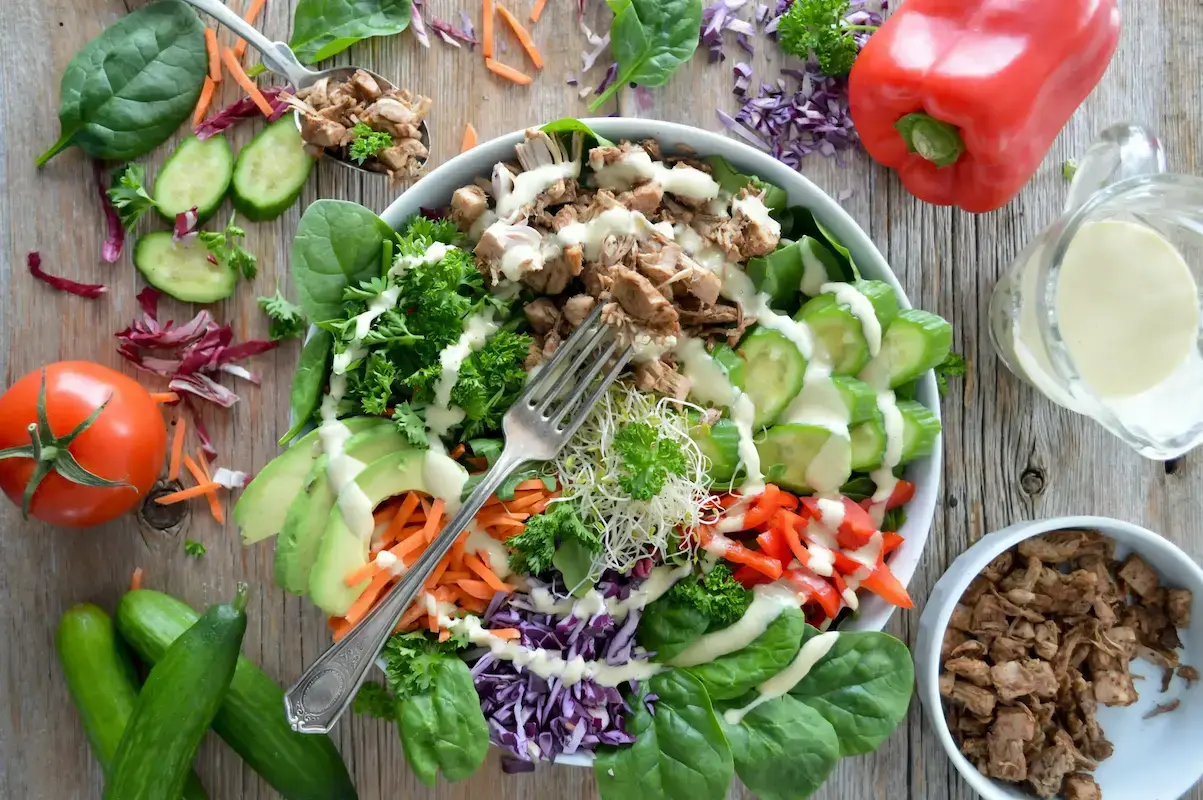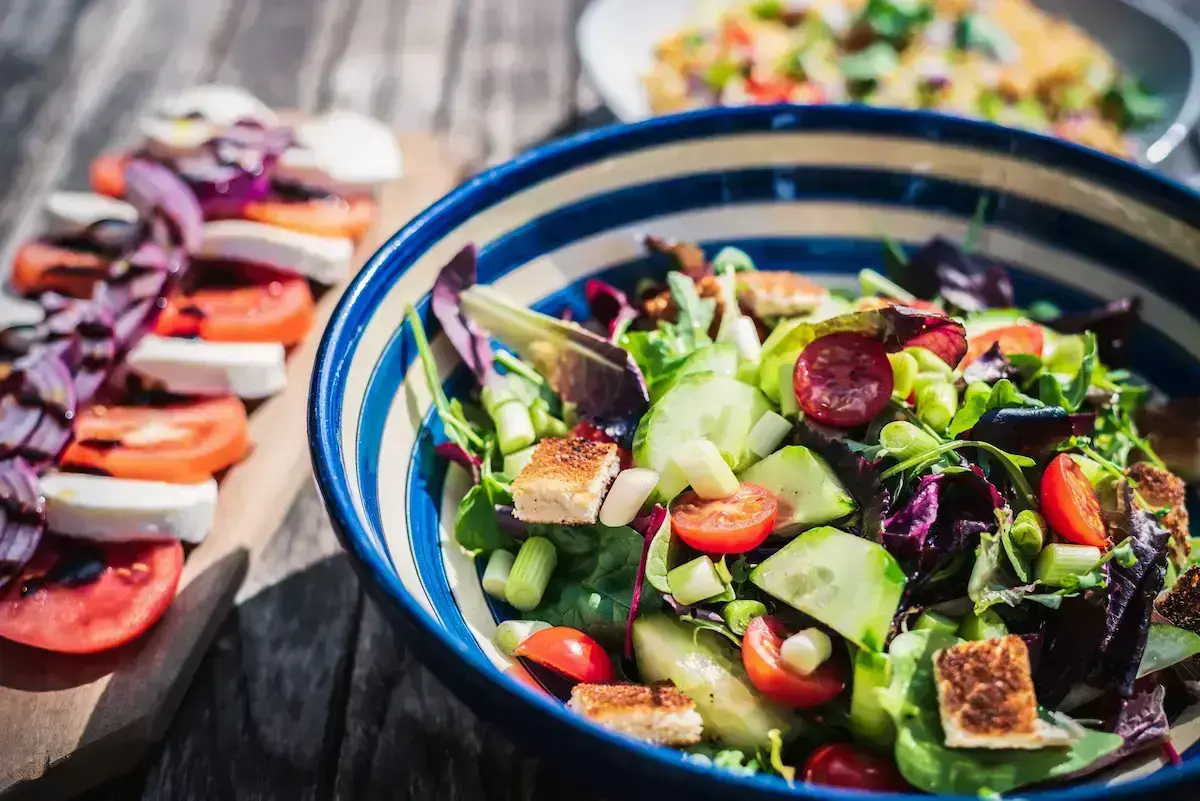The Healthy Mediterranean Diet in Morocco
Morocco, a country rich in culture and history, is known for its vibrant souks, stunning landscapes, and delectable cuisine. But beyond the beauty and flavours that Morocco has to offer, its people have long been following a diet that has now gained global recognition – the Mediterranean diet.
The healthy Mediterranean diet in Morocco is much more than just a trendy eating plan; it is a way of life that has been ingrained in Moroccan culture for generations. The people of this country have been nourishing themselves with the principles of the Mediterranean diet long before it was hailed as a preventive measure for various medical conditions and a popular choice for weight loss.
While many diets claim to be the answer to a healthier and happier life, the Mediterranean diet in Morocco stands apart for its simplicity and balance. It focuses on consuming a variety of whole foods, such as fruits, vegetables, legumes, whole grains, nuts, lean proteins, and healthy fats, while minimizing processed foods, added sugars, and unhealthy fats.
Key Principles of the Mediterranean Diet

Extra Virgin Olive Oil
One of the key principles of the Mediterranean food in Morocco encourages the consumption of healthy fats, such as extra virgin olive oil, nuts, and argan oil. While argan oil is commonly known for its use in cosmetic products and skin care, it is also used for eating in Morocco and is exclusive to the region. Similar to olive oil, argan oil can be drizzled over salads, used as a cooking oil, or enjoyed as a dip with bread, adding a unique and flavourful element to Moroccan cuisine.
Local Fresh Vegetables and Fruits
Furthermore, the Mediterranean diet is the use of fresh and local ingredients. In Morocco, this means incorporating an abundance of local fresh vegetables and fruits into daily meals. From juicy oranges and succulent dates to fragrant mint and vibrant tomatoes, Moroccans have access to a wide variety of local produce that adds a burst of freshness to their dishes.
Lean Proteins
In addition to these plant-based foods, the Mediterranean diet in Morocco also includes a moderate consumption of lean proteins Chicken, turkey, beef, and lamb are also common sources of protein in Moroccan cuisine and are typically prepared using methods that minimize the use of excessive oils or frying, such as chicken tagine and lamb or beef tagine. The balance of protein, whole grains, and vegetables in Moroccan meals not only provides essential nutrients but also contributes to a feeling of satiety and promotes healthy weight management.
Fish For Omega-3 Fatty Acids
Fresh fish varieties, such as sardines, anchovies, pandora, whiting, mackerel, shrimp, and more, are staples in the Moroccan-Mediterranean diet. Grilling or baking these flavourful fish options not only creates a mouthwatering meal, but also provides a rich source of omega-3 fatty acids. Incorporating these fish into your diet is a delicious way to promote heart health and weight management.
Whole Grains and Nuts
Another important aspect of the Mediterranean diet in Morocco is the consumption of whole grains. Traditional Moroccan bread, known as khobz, is often made with whole wheat flour, providing a good source of fibre and nutrients. Couscous, a staple in Moroccan cuisine, is made from semolina and is typically served with an array of vegetables, herbs, and proteins. Nuts, such as almonds and walnuts, are frequently incorporated into dishes and desserts or consumed as a snack, providing a good source of healthy fats and micronutrients.
Spices and Herbs
One distinguishing feature of the Moroccan interpretation of the Mediterranean diet is the generous use of spices and herbs. Moroccan cuisine is renowned for its aromatic and flavourful combinations, with spices like saffron, cumin, turmeric, and cinnamon, as well as herbs like parsley, coriander, basil, mint, dill, and many more being staples in the kitchen. These spices and herbs not only add depth and complexity to dishes but also offer a range of potential health benefits, including anti-inflammatory and antioxidant properties.
Daily Exercise
The Mediterranean diet in Morocco goes beyond just the food choices and encompasses a holistic lifestyle approach. Physical activity, such as walking or engaging in traditional activities like dancing and gardening, is incorporated into daily routines. The combination of nourishing the body with wholesome foods and engaging in regular exercise contributes to overall better health and vitality.
Benefits of a Healthy Balanced Diet
Following a healthy balanced diet has numerous long-term health benefits that extend beyond just nourishing the body. By focusing on wholesome, nutrient-dense foods and maintaining a proper balance of nutrients, you can positively impact various aspects of your well-being, from weight management to heart health, and even the prevention of certain chronic diseases.
Weight loss is often a significant goal for many individuals, and a healthy balanced diet is a fundamental tool in achieving and maintaining a healthy weight. Heart health is a critical aspect of overall well-being, and a balanced diet plays a crucial role in maintaining cardiovascular wellness.
Furthermore, research suggests that a healthy balanced diet may contribute to the prevention or management of other chronic conditions such as Alzheimer’s disease and diabetes. In addition to the physical benefits, a healthy balanced diet can also improve your mental and emotional well-being. Maintaining a healthy balanced diet can also have a positive impact on your energy levels and overall vitality. Moreover, a healthy balanced diet sets the foundation for a strong immune system. By prioritizing a healthy balanced diet, you are investing in your long-term health and well-being.
It is important to remember that a healthy balanced diet is not just a temporary solution but a lifelong commitment to your well-being. By making mindful food choices and prioritizing a variety of whole, unprocessed foods, you can nourish your body and reap the long-term benefits of improved weight management, heart health, cognitive function, and reduced risk of chronic diseases.
Incorporating physical activity into your daily routine will further enhance the benefits of a healthy balanced diet. Regular exercise helps with weight management, improves cardiovascular health, and boosts mood and overall well-being.
Remember, a healthy balanced diet is not about restriction or deprivation; it’s about nourishing your body with wholesome foods that support optimal health. The key is to make sustainable lifestyle changes that can be maintained in the long run.
The Joy of Food and Community
Food has always been at the heart of Mediterranean and Moroccan cultures, bringing people together, fostering connections, and creating lasting memories. The dining traditions of these regions go beyond mere sustenance; they celebrate the communal aspect of sharing a meal with loved ones.
In Moroccan dining traditions, meals are often enjoyed in a leisurely manner, with family and friends gathering around a table to savour the flavours and engage in meaningful conversations. It is a time for storytelling, laughter, and bonding, where the focus is not just on the food itself but the experience shared with others.
These dining traditions encourage a slower pace of life, allowing for the enjoyment of each bite and the appreciation of the company present. It is a chance to disconnect from the fast-paced world and reconnect with loved ones, strengthening relationships and building a sense of community.
Moreover, the act of preparing and sharing a meal is regarded as an expression of love and care. In Moroccan culture, preparing a meal is often seen as a labour of love, with traditional dishes requiring time and effort to create. Inviting others to partake in the meal is a gesture of hospitality and generosity.
Top Mediterranean Dishes from Moroccan Cuisine to Try
Here are some practical tips and delicious recipe suggestions to help you incorporate Mediterranean dishes from Morocco into your everyday meals:
1. Start your day with an energizing Moroccan breakfast by enjoying boiled eggs drizzled with extra virgin olive oil and cumin, hearty whole wheat baghrir or melawi topped with fresh berries, a drizzle of honey, and a sprinkle of toasted nuts. Alternatively, you can spread some amlo butter on your bread for an extra treat.
2. For lunch, whip up a flavourful Chicken Tagine spiced with preserved lemon and olives or prepare a wholesome Moroccan salad filled with mixed greens, cherry tomatoes, cucumber, lettuce, and olives. Dress your bowl with a simple vinaigrette made with olive oil, lemon juice, and black pepper or cumin.
3. For dinner, explore the Moroccan cuisine with a mouthwatering dish like grilled Moroccan-spiced chicken served alongside a side of bakkoula, a spinach-like side seasoned with preserved lemon and Moroccan spices, or a traditional Moroccan harira soup spiced with fresh tomatoes, parsley, celery, chickpeas, and lentils for an earthy taste accompanied with dates for a sweet and tantalizing finish.
4. Snack on a handful of Moroccan mixed nuts, lightly roasted with a blend of cinnamon, cumin, and paprika. This satisfying and nutritious snack will keep you satiated, or choose from the large variety of healthy Moroccan cakes such as feqqas, ghriba and more to satisfy your sweet tooth cravings.

